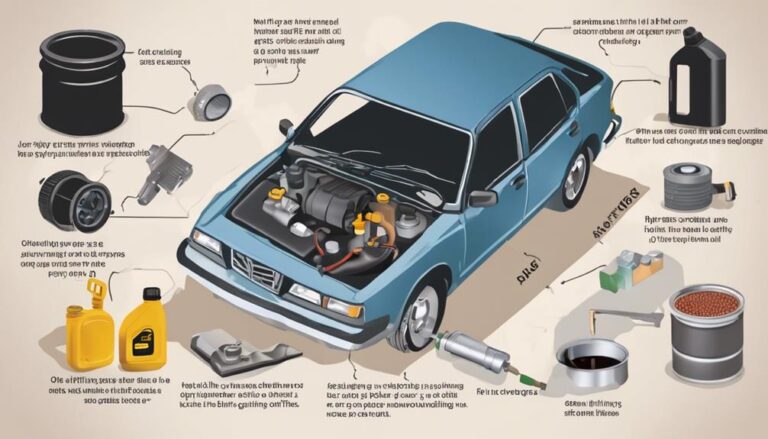What Is the Recommended Frequency for Oil Changes?
You might think that changing your oil every month is the best practice, but the reality may surprise you.
Understanding the optimal frequency for oil changes can help you maintain your vehicle's engine health efficiently and save you unnecessary trips to the mechanic.
Let's explore the factors that influence how often you should change your oil and why following the manufacturer's guidelines is crucial in ensuring your car's longevity.
Key Takeaways
- Driving habits and mileage impact oil change frequency.
- Following manufacturer guidelines preserves engine health.
- Synthetic oil allows for extended oil change intervals.
- Regular filter replacement enhances engine performance and longevity.
Factors Influencing Oil Change Frequency
When determining the frequency of oil changes, various factors such as driving habits, mileage accumulation, and car age must be considered. Your driving habits, whether you engage in stop-and-go city driving or highway cruising, greatly influence how often you should change your oil. Stop-and-go driving can lead to more frequent oil changes due to increased engine stress. Additionally, the quality of oil used is essential. Opting for synthetic oil over conventional can prolong the time between changes due to its advanced properties that offer better protection and longevity.
Mileage accumulation is another crucial factor to keep in mind. The more you drive, the more frequently you should change your oil to maintain optimal engine performance. As your car ages, it may require more frequent oil changes to combat wear and tear on engine components. By considering these factors alongside the quality of oil you use, you can ensure your vehicle runs smoothly and efficiently.
Importance of Regular Oil Changes
Regular oil changes play a crucial role in maintaining your vehicle's engine health and performance. Engaging in preventive maintenance by adhering to the recommended oil change frequency is vital to prevent engine wear and damage, ensuring optimal performance and longevity.
By following the manufacturer's guidelines for oil changes, you not only preserve warranty coverage but also enhance your vehicle's reliability. Consistent oil changes are an essential aspect of engine maintenance, as they help prevent issues like overheating and component failure.
Neglecting regular oil changes can lead to costly repairs and breakdowns, impacting both your wallet and your driving experience. Moreover, proper oil changes contribute to improved fuel efficiency, reducing emissions and lessening your environmental impact.
Therefore, make sure to prioritize regular oil changes to keep your engine running smoothly and efficiently, promoting overall vehicle health and performance.
Benefits of Timely Filter Replacement

To maintain optimal engine health and performance, timely filter replacement is essential for ensuring proper filtration of contaminants in the engine oil, preventing wear and damage to engine components. By replacing filters at recommended intervals, you can experience improved engine performance and extend your engine's longevity. Check out the table below for a visual summary of the benefits of timely filter replacement:
| Benefits of Timely Filter Replacement | |
|---|---|
| Improved Engine Performance | Reduces wear and damage to engine components by maintaining proper filtration. |
| Enhanced Engine Longevity | Prevents debris circulation, ensuring engine cleanliness and longevity. |
| Optimal Oil Flow | Prevents oil flow restrictions, enhancing lubrication efficiency. |
| Fuel Efficiency | Promotes fuel efficiency and overall engine health. |
Extended Oil Change Intervals Explained
For understanding the rationale behind extended oil change intervals, consider the technological advancements in modern vehicle engines. Synthetic oil benefits play a crucial role in allowing longer intervals between changes. Contrary to misconceptions, synthetic oils are designed to withstand higher temperatures and last longer than conventional oils, making them ideal for extended use.
Engine longevity is also a key factor in extending oil change intervals. Newer vehicles are equipped with advanced oil-life monitoring systems that analyze driving conditions and adjust recommended change intervals accordingly. To maintain engine health between changes, it's essential to check oil levels monthly and top up as needed.
Following manufacturer recommendations, especially for synthetic oil usage, and using high-quality oil are vital for determining the optimal extended oil change intervals. By staying informed and adopting proper maintenance tips, you can enjoy the benefits of extended oil change intervals while ensuring the longevity of your vehicle's engine.
Professional Recommendations for Oil Changes

Considering driving habits, conditions, and oil type is crucial when determining the optimal frequency for oil changes according to professional recommendations. Expert opinions suggest that following industry standards is essential, but personalized schedules based on individual factors can lead to increased customer satisfaction. Professional technicians emphasize the importance of consulting the owner's manual for specific guidelines tailored to your vehicle. Here is a breakdown of some common expert recommendations:
| Factors to Consider | Professional Advice |
|---|---|
| Driving Habits | Regular city driving may require more frequent oil changes compared to mostly highway driving. |
| Operating Conditions | Extreme conditions like towing, off-roading, or frequent short trips may necessitate shorter intervals between oil changes. |
| Oil Type | Synthetic oils typically last longer and may allow for extended oil change intervals compared to conventional oils. |
Frequently Asked Questions
How Often Do I Really Need an Oil Change?
You should consider extended intervals for oil changes based on your driving habits and vehicle specifications. This decision can impact the environment positively by reducing waste. Regular monitoring of oil quality and levels is crucial.
Should I Go by Oil Life or Mileage?
To decide between oil life and mileage for oil changes, monitor both factors. Follow maintenance schedules based on the stricter criteria of oil life or mileage, whichever comes first. Regular checks ensure optimal engine health.
Is It OK to Change Oil Once a Year With Low Mileage?
Changing oil annually with low mileage is essential for engine health. Regular maintenance ensures proper lubrication, prevents sludge, and maintains efficiency. Following this practice helps protect engine components, promoting longevity and optimal performance.
Is It OK to Go 10000 Miles With Synthetic Oil?
With synthetic oil's longevity, going 10,000 miles before changing is safe. Its extended oil change intervals are beneficial, saving time and money. Follow your manufacturer's guidelines for optimal engine health. Enjoy the convenience and efficiency.
Conclusion
In conclusion, maintaining a regular oil change schedule is crucial for the longevity and performance of your vehicle.
By following manufacturer recommendations and considering factors such as driving conditions and oil type, you can ensure optimal engine health.
Remember, neglecting oil changes can lead to engine damage and costly repairs down the line.
Stay on top of your maintenance schedule to keep your car running smoothly and efficiently.







